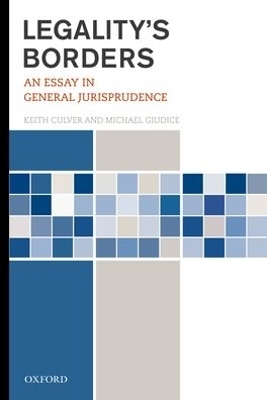
Legality's Borders
Oxford University Press Inc (Verlag)
978-0-19-537075-1 (ISBN)
KEITH C. CULVER is Professor and International Chair in Generating Eco-Innovation, in the UniverSud Paris. From 1997 to 2009 he taught at the University of New Brunswick, Fredericton, where he was director of the Centre for Social Innovation Research. He holds degrees from the University of Victoria (BA Hons), McMaster University (MA), and the University of Guelph (PhD), and has held visiting fellowships at the universities of Edinburgh, Stirling, and Oxford. His research at the intersection of law, philosophy, and technology has ranged from work on e-democracy to investigation of fisheries and aquaculture. MICHAEL GIUDICE is Assistant Professor of Philosophy at York University, Member of the Graduate Faculty at Osgoode Hall Law School, and Associate of the Jack and Mae Nathanson Centre on Transnational Human Rights, Crime, and Security. He has studied at both the University of New Brunswick (BA Hons) and McMaster University (MA, PhD), and was also a Visiting Student in Analytic Legal Philosophy and a Commonwealth Scholar at the University of Oxford. He has published several articles in the philosophy of law, and is currently co-editing a three volume collection on contemporary legal theory for Ashgate Publishing.
Table of Contents
Chapter 1. Introduction
1.1. Imbalance in Analytical Legal Theory's Approach to Prima Facie Legal Phenomena
1.2. New Phenomena
1.2.1. Intra-State Legality
1.2.2. Trans-State Legality
1.2.3. Supra-State Legality
1.2.4. Super-State Legality: Claims to Universality in Peremptory Jus Cogens Norms
1.3. State-Based Legal Theory
1.4. Re-Balancing After Imbalance: An Incremental Addition to Analytical Legal Theory
Chapter 2. Legal Officials, the Rule of Recognition, and International Law
2.1. Structure and Function of the Rule of Recognition
2.2. Explaining Officials' Contribution to the Rule of Recognition: Facing Circularity and Indeterminacy
2.2.1. Officials by Office and Attitude
2.2.2. Speculative Social Anthropological Accounts
2.3. Hierarchy in the Rule of Recognition
2.4. The Rule of Recognition and International Law
2.4.1. Not a System but a Set
2.4.2. International Rules of Change and Adjudication
2.4.3. International Legal Officials?
2.4.4. Kelsen's Account of International Law
Chapter 3. The Hierarchical View of Legal System and Non-State Legality
3.1. Raz's Structural Account of Legality
3.2. Functional Assessment of Raz's Account of Legality
3.2.1. Indeterminacy at the Borders
3.2.2. Parochialism
3.3. State-Centred Hierarchy
3.4. Non-State Legality
3.4.1. Hierarchy and the European Union
3.4.2. Trans-State Legality Revisited
Chapter 4. Meta-Theoretical-Evaluative Motivations
4. 1. Perspective, Phenomena, Problems, and Method
4.1.1 The Ordinary Person's Perspective and a Contingent Concept
4.1.2. Bootstrapping in Analytical Legal Theory
4. 2. Recent Approaches to the Problem of Perspective
4.2.1. System and Set
4.2.2. Network Theory
4.2.3. International Relations Theory
4. 3. Renewed Perspective
Chapter 5. An Inter-Institutional Theory
5.1. Elements of Legality
5.1.1. Content-Independent Reasons for Action
5.1.2. Legal Normative Powers
5.1.3. Institutions of Law
5.1.4. Legal Institutions
5.1.5. Mutual Reference and Intensity
5.2. The Systemic Law-State
5.2.1. Minimum Content of Natural Law
5.2.2. Comprehensiveness, Supremacy, and Openness
5.2.3. System
5.3. The Narrative Concept of Law and the Problems of Circularity and Indeterminacy
Chapter 6: An Inter-Institutional Account of Non-State Legality
6.1. Meta-Theory Revisited: Between Legal Pluralism and Geo-Centric Statism
6.2. Meeting the Explanatory Challenge: Bringing Elements of Legality to Bear on Explanatory Problems Beyond the Systemic Law-State
6.2.1. Intra-State Legality
6.2.2. Trans-State Legality
6.2.3. Supra-State Legality
6.2.4. Super-State Legality
Chapter 7. Fresh Problems
7.1. Pathologies of Legality
7.2. Novel Technologies and their Implications for Conceptions of Legality
7.3. Re-balance after Imbalance: the Consequences of Re-socializing a Descriptive-Explanatory View of Law
Index
| Erscheint lt. Verlag | 8.4.2010 |
|---|---|
| Verlagsort | New York |
| Sprache | englisch |
| Maße | 211 x 147 mm |
| Gewicht | 363 g |
| Themenwelt | Geisteswissenschaften ► Philosophie |
| Recht / Steuern ► Allgemeines / Lexika | |
| Recht / Steuern ► EU / Internationales Recht | |
| ISBN-10 | 0-19-537075-9 / 0195370759 |
| ISBN-13 | 978-0-19-537075-1 / 9780195370751 |
| Zustand | Neuware |
| Haben Sie eine Frage zum Produkt? |
aus dem Bereich


